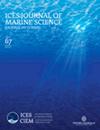Modelling perspective on the climate footprint in south east Australian marine waters and its fisheries
IF 3.4
2区 农林科学
Q1 FISHERIES
引用次数: 0
Abstract
South eastern Australia is a global warming hotspot, and is also home to ~70% of Australia’s population and one of Australia’s largest fisheries—the South East Scalefish and Shark Fishery. This fishery spans shelf to deep waters, subtropical to temperate waters, employs many gears, and interacts with over 100 species. Despite following best practice fisheries management principles, including taking an ecosystem perspective to overall fisheries interactions, management interventions have failed to arrest or recover the decline of some focal species. Using an Atlantis ecosystem model developed for the fishery over the past 20 years, this paper presents simulations that suggest climate change may be a major contributor to the trajectories seen for a number of species—such as jackass morwong (Nemadactylus macropterus), blue warehou (Seriolella brama), and gemfish (Rexea solandri). This kind of climate influence poses many challenges for fisheries management into the future, raising questions about what to do when climate change undermines or overrides fisheries management actions and objectives.对澳大利亚东南部海域及其渔业的气候足迹进行建模
澳大利亚东南部是全球变暖的热点地区,也是澳大利亚约70%人口的家园,也是澳大利亚最大的渔场之一——东南鳞鱼和鲨鱼渔场。这个渔场横跨大陆架到深海,亚热带到温带水域,使用许多齿轮,与100多个物种相互作用。尽管遵循了最佳实践渔业管理原则,包括从生态系统角度看待整体渔业相互作用,但管理干预措施未能阻止或恢复一些焦点物种的衰退。利用过去20年来为渔业开发的亚特兰蒂斯生态系统模型,本文进行了模拟,表明气候变化可能是许多物种(如jackass morwong (Nemadactylus macropterus), blue warehou (Seriolella brama)和gemfish (Rexea solandri))轨迹的主要因素。这种气候影响给未来的渔业管理带来了许多挑战,提出了当气候变化破坏或压倒渔业管理行动和目标时该怎么办的问题。
本文章由计算机程序翻译,如有差异,请以英文原文为准。
求助全文
约1分钟内获得全文
求助全文
来源期刊

ICES Journal of Marine Science
农林科学-海洋学
CiteScore
6.60
自引率
12.10%
发文量
207
审稿时长
6-16 weeks
期刊介绍:
The ICES Journal of Marine Science publishes original articles, opinion essays (“Food for Thought”), visions for the future (“Quo Vadimus”), and critical reviews that contribute to our scientific understanding of marine systems and the impact of human activities on them. The Journal also serves as a foundation for scientific advice across the broad spectrum of management and conservation issues related to the marine environment. Oceanography (e.g. productivity-determining processes), marine habitats, living resources, and related topics constitute the key elements of papers considered for publication. This includes economic, social, and public administration studies to the extent that they are directly related to management of the seas and are of general interest to marine scientists. Integrated studies that bridge gaps between traditional disciplines are particularly welcome.
 求助内容:
求助内容: 应助结果提醒方式:
应助结果提醒方式:


